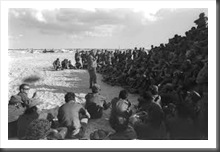 I was a 19-year-old kid when the Yom Kippur War broke out.
I was a 19-year-old kid when the Yom Kippur War broke out.
In North Manchester, U.K. you’d have thought all hell had been let loose.
It was Saturday 06 October 1973. I’d worked in the area for barely a month and was attending prayers at the Holy Law Synagogue. So it was from the vantage point of the upstairs women’s section that I spotted the congregation’s non-Jewish caretaker disturb the dreamy languor of the afternoon service by scurrying into the sanctuary to give the presiding rabbi a note. It was to say that Israel had been attacked on two fronts.
The rabbi was the late, often controversial Irishman Ivan Wachmann who was endowed with a great sense of theatre. He yelled, read the message to the congregation, flung open the doors of the Holy Ark containing the Torah scrolls and began to chant the psalms of supplication.
It was, after all, the afternoon of Yom Kippur, the deepest part of the holiest day in the Jewish calendar. Israel’s enemies had accomplished their evil intent with aplomb, catching us all, as it were, ‘pat while we were praying’!
Fighting continued for what seemed an interminable three  weeks, resulting in 2,656 IDF deaths and a combined total of 9,000 civilian and military wounded. Fearing the worst, the authorities had prepared mass graves for 30,000 corpses.
weeks, resulting in 2,656 IDF deaths and a combined total of 9,000 civilian and military wounded. Fearing the worst, the authorities had prepared mass graves for 30,000 corpses.
But judging by the way the Israeli media are treating the anniversary, the deep psychological scars still run savagely raw, even four decades on.
“Forty years after the Yom Kippur War”, wrote Dan Margalit in Israel Hayom, “Israelis still have not forgiven Golda Meir and hostility toward her has been passed down from generation to generation. But … most Israelis belatedly understand that the Yom Kippur War was a big victory. While remembering the many fallen, the average Israeli not only sees depressive darkness, but also the light of reality”.
This year, the fast day also occurred on a Sabbath – but almost a secular month earlier than is usual. It, too, will be remembered in Israel for a long time as every citizen, whether religious or not, battled with extraordinary heat and a raging thirst. Here are some statistics:
- Paramedics from Magen David Adom (Israel’s emergency service) were called to 2,566 incidents, with 1,973 people being transported to hospital. The fast and high temperatures caused 130 people to faint and 16 people required resuscitation. MDA crews also transported 145 expectant mothers to hospital to give birth and assisted with a further six home births.
- As Israeli roads are empty on the fast day, it is the custom for children to ride their bikes along them. This year, more than 200 children sustained injuries including a nine-year old Haifa girl who was hospitalised with a moderate to severe head wound. A further 19 people throughout the country were lightly injured in road accidents while MDA medics responded to 24 incidents of violence, four of which had ended in moderate injuries.
-
msniw
No comments:
Post a Comment